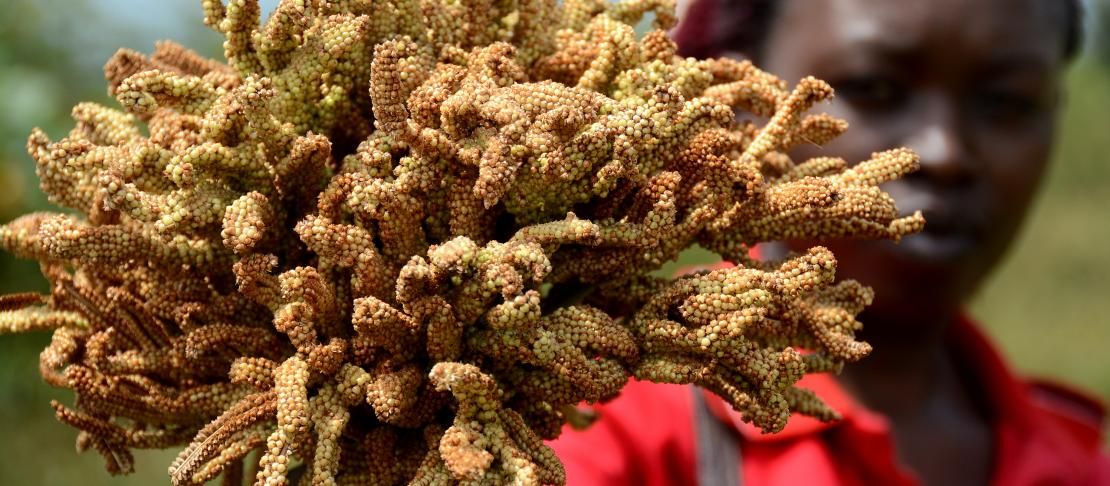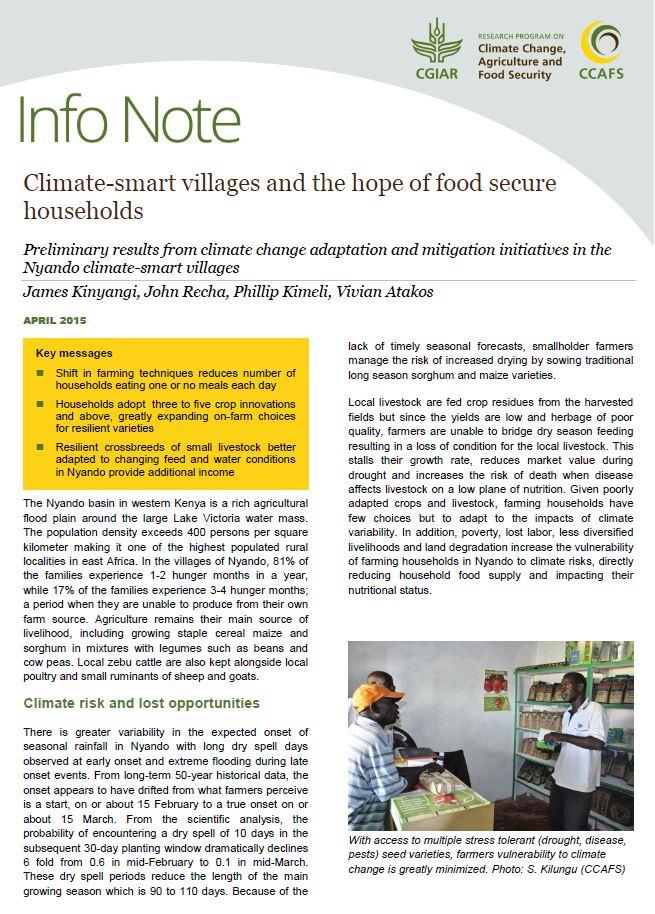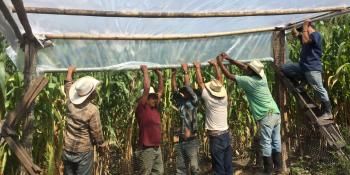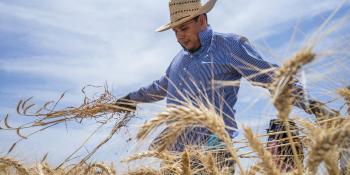CCAFS early career scientist wins best paper award at climate change conference

Symposium presented opportunity to share experiences from research, field projects and best practice in climate change adaptation in African countries.
Catherine Mungai, a researcher at the CGIAR Research Program on Climate Change, Agriculture and Food Security (CCAFS) has won an award for best paper at the recently concluded Symposium on Climate Change Adaptation in Africa held in Addis Ababa, Ethiopia between 21-23 February 2016.
The purpose of the symposium was to showcase experiences from research, field projects and best practice in climate change adaptation in African countries, which may be useful or implemented in other countries in the continent. Out of the 600 papers submitted for the symposium, three CGIAR Research Program on Climate Change, Agriculture and Food Security (CCAFS) East Africa papers—focusing on emerging lessons from the Nyando Climate-Smart Villages in Western Kenya— were part of the 65 that made the final cut. The symposium was jointly hosted by Addis Ababa University, Manchester Metropolitan University in the United Kingdom and Hamburg University of Applied Sciences in Germany.
Adoption of Climate-Smart Agriculture (CSA) through a Gendered Intersectionality Lens: Experiences from Western Kenya
This best paper presentation was made by Catherine Mungai who undertook the study as part of a one year research fellowship in 2015 by the Climate Impact Research Capacity and Leadership Enhancement (CIRCLE) fellowship program awarded through the International Livestock Research Institute (ILRI). The study demonstrated how a gendered intersectionality lens can be used to explore how and the extent to which farming communities are coping with climate change. The study highlights the CSA technologies and practices different categories of female and male farmers are adopting while showing how factors such as age, ethnicity, education, and marital status intersect with gender to influence the uptake of CSA technologies and practices.
Emerging results show that there is a high uptake of CSA interventions amongst married couples living together. This can be attributed to the fact that husbands and wives can share responsibilities as well as information. Using marital status as a lens, for example, helps us to understand the vulnerability and adaptive capacity of men and women within the context of marriage, or as singles, divorcees or as widows and widowers. The education lens on the other hand shows a higher percentage of CSA uptake amongst farmers with primary and secondary level education. Basically, using a gendered intersectionality lens strengthens the argument for targeted interventions which focus on local needs and priorities while recognizing local contexts as informed by social, cultural and economic factors.
Read more from the ILRI blog: Catherine Mungai wins best paper prize at symposium on climate change adaptation in Africa
Watch a video interview where Catherine explains more about her research.
Uptake of resilient crop interventions
Since 2011, CCAFS scientists in collaboration with national and international research partners, development practitioners, private sector and farmers through community based organizations (CBOs) are working together to evaluate a portfolio of CSA interventions aimed at increasing productivity and incomes, building resilience and adaptive capacity and enhancing food security. In her presentation 'Managing climate risks through resilient crop interventions and climate-smart villages approach,' Maren Radeny highlighted the changes households are making in crop farming practices to address climate risks, adapt to climate change, and improve food security and incomes in the CSVs. The baseline survey data conducted in 2011 and annual monitoring survey (2012-2015) data were used to gather information on agricultural enterprises, changes in crop types and varieties, crop management, use of inputs and land management.
Preliminary results show that there is a significant increase in the number of households adopting three or more resilient crops with multiple uses such as pigeon peas, green grams, sorghum, finger millet and cassava. This will greatly expand on-farm choices for resilient varieties. The key attributes of the improved crop varieties being adopted by the farmers are: early maturing, faster growth rates and resistant to certain pests and diseases. Some of the crops such as sweet potatoes are attractive due to their multiple uses, i.e. for food and livestock feed.
This paper highlighted an urgent need to strengthen rural institutions that accelerate and expand the uptake of CSA technologies and practices as well as increased investments in climate information for farmers and strengthening extension services (public and private) important for increased uptake of CSA.
Farmers learn how to read the world differently through the Farms of the Future Approach
In his presentation titled 'Strengthening Farmer Adaptive Capacity through Farms of the Future Approach in Nyando, western Kenya,' Philip Kimeli demonstrated how the CCAFS Climate Analogues tool can be used to help farmers identify adaptation strategies. Through the FOTF approach piloted in Lushoto Tanzania, the analogues tools is used to build on farmer-to-farmer exchanges to analogue sites to improve adaptive capacity and support knowledge exchange, including technology transfer.
Building on a training workshop that was held in early January 2014, the CCAFS team organized a learning journey to expose Nyando farmers to ongoing adaptation strategies in their “future climate” sites. Over a period of eight days, 16 farmers (7 men and 9 women) and 7 agricultural innovations stakeholders were exposed to a variety of ongoing climate change adaptation projects focusing on soil and water management, agricultural and farm mechanization, agro processing and value addition, livestock interventions, crop diversification and management, resilient crop varieties, better agronomic practices, agro-forestry and institutional innovations such as community banks and savings and credit co-operative.
While the farmers explored future scenarios, encouraging forward-thinking as they prepare for their future climate, the need to improve the understanding of local practices and available tools and resources to enable transformative change was observed. Especially, social and cultural practices which hinder adaptation such as access to and control over resources is critical for equitable adaptation. Essentially, strengthening the adaptive capacity of the farmers in Nyando will require institutional support, extensive capacity building, structural and policy changes.
What does all this mean for policy?
Kenya has made great strides in developing policies and programmes to address climate change in the agriculture sector. Evidence emanating from the CCAFS CSVs in Nyando can therefore be used to strengthen the case for investing in climate-smart agriculture.
Next steps
The conference organizers are now putting together the 'African Climate Teach-In Day,' an on-line event where the papers will be shared further across the African continent. In his closing remarks Prof Walter Leal from Hamburg University pointed out that another symposium will be organized in 2017 in Nigeria. It is anticipated that this event will focus on integrating mitigation and adaptation strategies to enhance food security in the African continent.
Catherine Mungai is a Partnerships and Policy Specialist at CCAFS East Africa. Phillip Kimeli is a Research Assistant at CCAFS East Africa.




